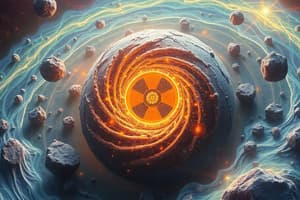Podcast
Questions and Answers
What is the charge of a beta particle?
What is the charge of a beta particle?
- No charge
- Positive charge
- Negative charge (correct)
- Neutral charge
What type of radiation has the highest penetrating ability?
What type of radiation has the highest penetrating ability?
- Radioactivity
- Beta particles
- Gamma rays (correct)
- Alpha particles
What is the main reason for the nucleus to be stable?
What is the main reason for the nucleus to be stable?
- A suitable ratio of protons to neutrons (correct)
- A high number of electrons in the outer shell
- A strong nuclear force
- A large number of neutrons
Who discovered radiation coming from uranium salts?
Who discovered radiation coming from uranium salts?
What is the result of a nuclear reaction?
What is the result of a nuclear reaction?
What is the charge of a β particle?
What is the charge of a β particle?
What is the purpose of radon barriers in new buildings?
What is the purpose of radon barriers in new buildings?
What is the use of carbon-14 in archaeology?
What is the use of carbon-14 in archaeology?
What is the composition of an α particle?
What is the composition of an α particle?
What is the purpose of Americium in smoke detectors?
What is the purpose of Americium in smoke detectors?
What happens to the carbon-14 in an organism when it dies?
What happens to the carbon-14 in an organism when it dies?
What type of radiation is emitted by Cobalt-60, used in cancer treatment?
What type of radiation is emitted by Cobalt-60, used in cancer treatment?
What is the purpose of irradiating food with Cobalt-60?
What is the purpose of irradiating food with Cobalt-60?
Why is Americium-241 safe to use in smoke alarms?
Why is Americium-241 safe to use in smoke alarms?
Why does the Americium-241 in a smoke alarm not need to be replaced?
Why does the Americium-241 in a smoke alarm not need to be replaced?
Flashcards are hidden until you start studying
Study Notes
Radioactivity
- Radioactivity is the spontaneous breaking up of certain unstable nuclei, accompanied by the emission of radiation.
Causes of Radioactivity
- An unstable nucleus disintegrates when the ratio of protons to neutrons is not suitable.
- Fragments and energy are emitted from the nucleus as it tries to achieve stability.
History of Radioactivity
- Henri Becquerel discovered radiation coming from uranium salts in the late 1800's.
- Marie and Pierre Curie continued this work, discovering polonium and radium.
- Marie Curie won Nobel prizes in 1903 and 1911, but later died from exposure to radioactive substances.
Types of Radiation
- Three types of radiation: alpha (α), beta (β), and gamma (γ) particles.
Alpha Particles (α)
- Consist of 2 neutrons and 2 protons stuck together (helium nuclei).
- Have a + charge and weak penetrating ability.
- Can be stopped by human skin, but are hazardous if ingested or inhaled.
Beta Particles (β)
- Ejected from the nucleus when neutrons disintegrate into protons and electrons.
- Have a - charge and more penetrative ability than α particles.
- Can be stopped by 5mm of aluminum.
Gamma Rays (γ)
- High energy rays with no mass or charge.
- Have very high penetrating ability and can be damaging to human cells.
- Require thick shields of lead or concrete to stop.
Radioactive Decay
- Alpha decay: atomic number decreases by 2, mass number decreases by 4.
- Beta decay: atomic number increases by 1, mass number remains the same.
Half-Life
- Time taken for half the atoms in a sample of a radioactive isotope to decay.
- Example: Radium-214 has a half-life of 20 minutes.
Radioisotopes
- Isotopes are elements with the same atomic number but different mass numbers.
- Radioisotopes are unstable and undergo radioactive decay.
- Examples: Carbon-14 (unstable) and Carbon-12 (stable).
Uses of Radioisotopes
- Carbon dating: estimates the age of carbon-containing objects.
- Medicine: Cobalt-60 is used in cancer treatment.
- Food Preservation: Cobalt-60 is used to kill micro-organisms and insects in food.
- Smoke Alarms: Americium-241 is used to detect smoke.
Background Radiation
- A low level of radiation surrounds us at all times.
- Natural sources of radiation in the environment, mainly from radon gas emitted from rocks.
- Radon barriers are installed in new buildings to prevent the gas from seeping in.
Studying That Suits You
Use AI to generate personalized quizzes and flashcards to suit your learning preferences.




